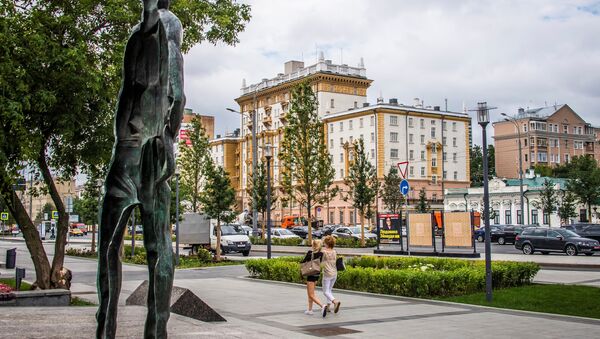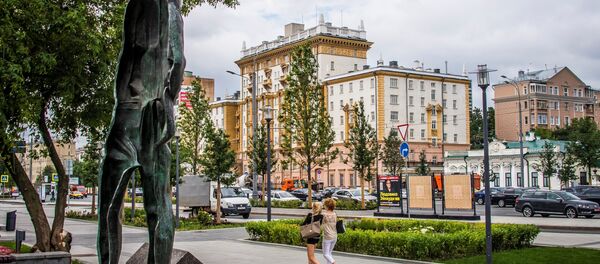WASHINGTON (Sputnik) – The United States began to scale back its visa services in Russia on Monday, drawing an angry reaction from Moscow three weeks after President Vladimir Putin ordered Washington to more than halve its embassy and consular staff.
The US Embassy in Russia has said that from August 23 it will suspend for an indefinite period the procedure for issuing non-immigrant US visas across Russia. On September 1 the procedure will resume, but only in Moscow.
"This is obviously a serious move," University of Pittsburgh School of Law lecturer in International Human Rights Professor Daniel Kovalik said on Tuesday. "To deny tourist, student and work visas to a country, which is what the US is doing in the case of Russia, is a very hostile move."
Russia is unlikely to take immediate action in response to the move, but the US measure adds to the chilling of relations between Moscow and the Trump administration, Kovalik, author of "The Plot to Scapegoat Russia," warned.
"It is tantamount to telling Russians that they are not welcome in the United States … It appears for now that Russia will not retaliate in kind, at least according to Foreign Minister Sergey Lavrov, but tensions will undoubtedly rise between the two nations as a result of this measure," he said.
The measure also comes with no rational explanation, as it does not advance US interests in any perceptible way, Kovalik noted.
"I honestly do not fathom what this move is meant to accomplish. The US continues to heap sanctions against Russia for no legitimate reasons that I can see," he said.
The latest round of US economic sanctions against Russia was approved by enormous majorities of 419-3 in the House of Representatives and by 98-2 in the Senate, yet they were passed right after Trump and President Vladimir Putin had held friendly talks in Hamburg, Kovalik recalled.
"The sanctions recently initiated by the US Congress came just after Trump and Putin had productive meetings at the G-20 meeting, where they agreed to cooperate on issues such as Syria and Ukraine," he said.
Congress appears to be deliberately destroying prospects for improved international relations, Kovalik observed.
"Why then the sanctions except to make sure that the US and Russia will not cooperate with each other, will not reach a détente?
The sanctions were promoted by powerful forces within the United States who seek to provoke a new wave of wars and global aggression, Kovalik said.
"I believe this is part of the strategy of sectors of the US ruling elite who see capitalism in grave crisis and have decided that the only thing to avert a total economic collapse is to prime the pump through more wars for oil, other natural resources and markets," he said.
However, such a policy is filled with dangers not only for the United States but for the entire world, Kovalik warned.
"This is obviously a very dangerous strategy which could lead to a possible nuclear war and the carnage that would follow… This is a very dangerous situation indeed!"
University of Rhode Island Professor of Peace Studies Nicolai Petro cautioned that the move to restrict Russian visa applications would be a significant step toward returning to the psychologically, as well as economically and diplomatically divided world of the Cold War era.
There is already a steady reduction in the quantities of information, goods, thought and ideas passing between Russia and West, though such interaction is urgently needed by both sides, he warned.
"Western elites are simply not interested in any exchange of information, ideas, thoughts, or people with Russia, and sanctions serve to both ensure and justify this," he said.
In 2016, 16 Italian consular employees in Moscow processed 478,000 visa requests and five Spanish diplomats issued 877,000 visas to Russians, but the personnel of US consulates, several-fold more, were only able to cope with about 186,000.



